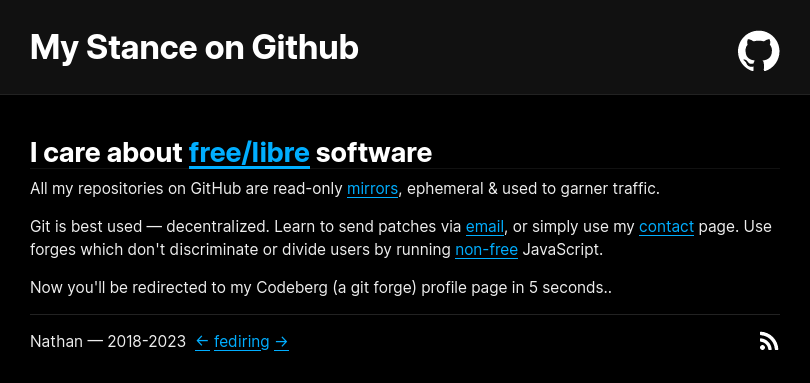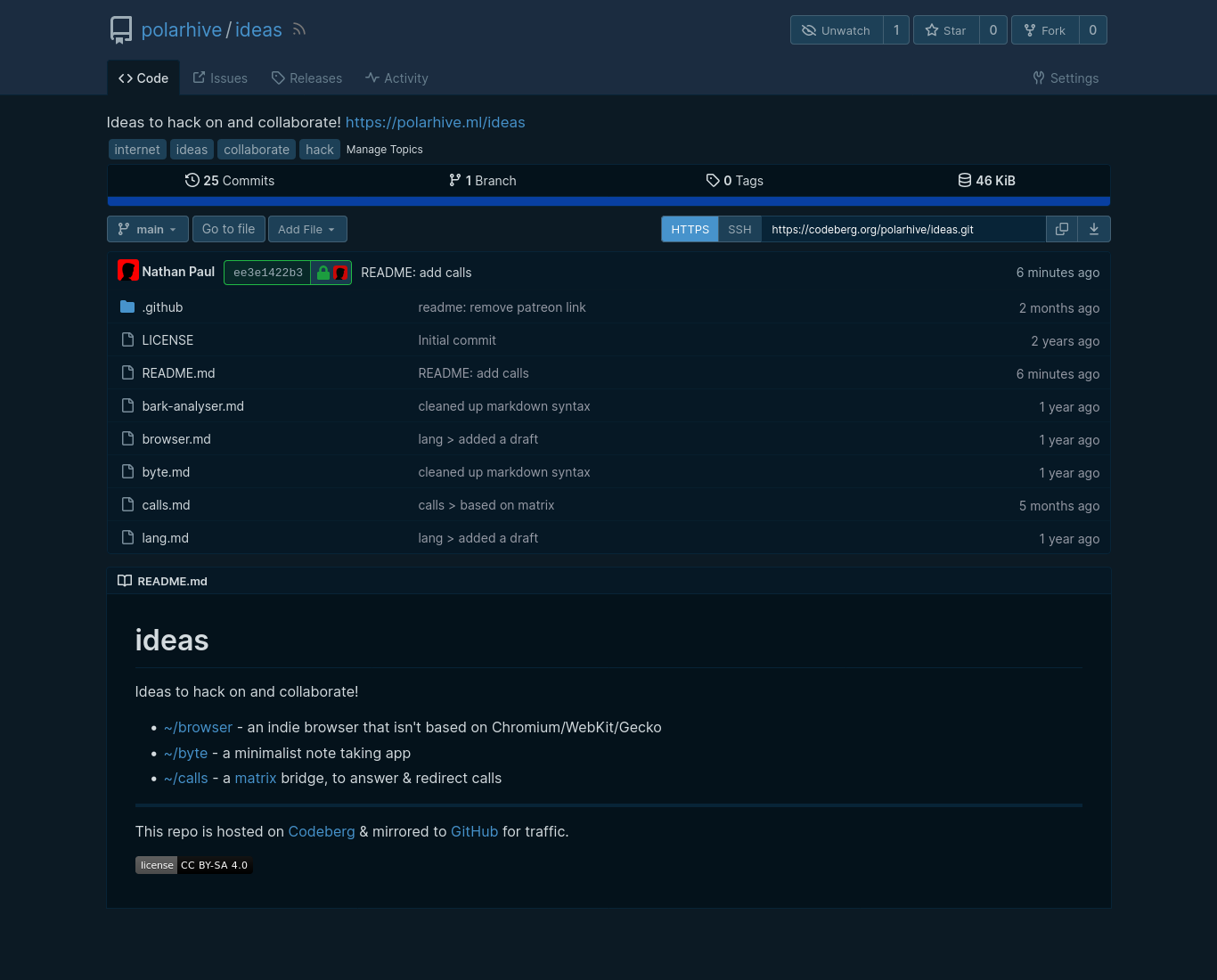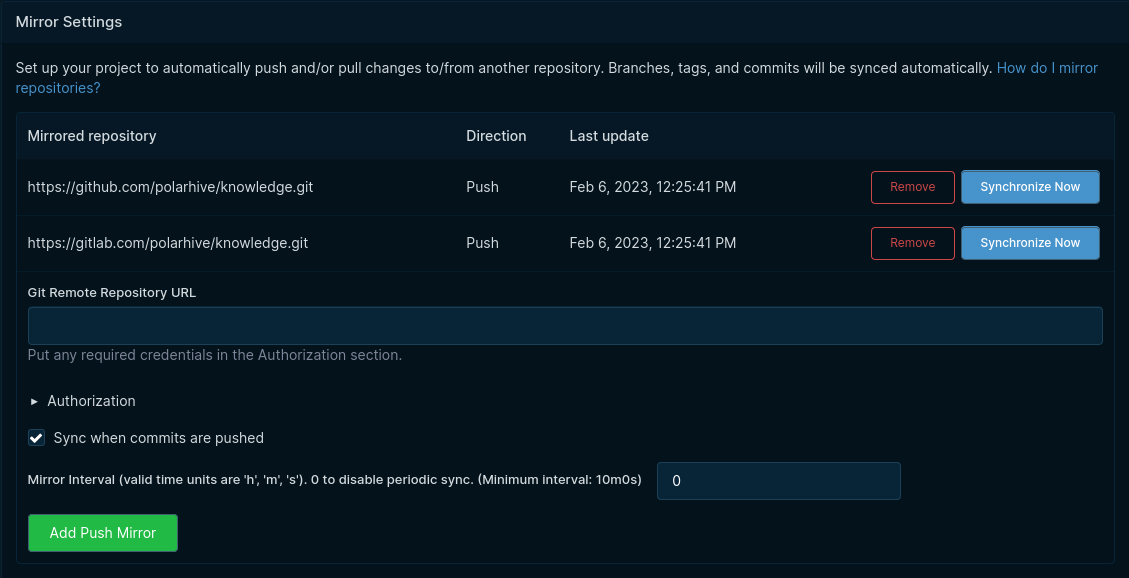If you’re into the FOSS/tech ecosystem; you’ve probably heard of ‘GitHub’
GitHub, now owned by Microsoft is a web-based social coding platform for everything “open source”. At least that’s how I feel they brand it. After the Microsoft takeover there has been a significant increase in traffic with new users joining the platform. Isn’t it ironic that GitHub itself isn’t open-source?

Oh, it’s on GitHub so your project must be open-source right??
Many people don’t know about the difference between open-source software and proprietary shareware. I’ve seen many cases where people use GitHub releases to distribute proprietary binaries of their programs. Some people don’t bother to license their software, they just dump it on GitHub, so even though you can see the source code you’re not legally allowed to modify / re-use it for your own project.
Your projects don’t have to be explicitly licensed under a FOSS license.
There are plenty of web-based git forges. GitLab, Codeberg, Sourcehut to
name a few. Isn’t it ironic that GitHub itself isn’t “oPen sOuRce”. Historically,
git(1) was meant to be used over email,
decentralized ✨

You can clone my project, make edits (commits) locally, then send me patches over email or any medium of your choice. All while retaining your copyright, when I apply your patch. Git was meant to be used this way, you don’t need to ‘fork’ or send ‘pull requests’ or make an account on a git forge.
I call open-source a ‘diluted marketing term’, it never talks about software freedom. I write free/libre software and wouldn’t call it opensource even if it technically is. Open-source is a fancy PR term that all the big-tech companies use. I don’t explicitly block GitHub or GitLab like I block Facebook, YouTube or other social media even though these forges are hosted on BigTech server farms. You are free to share my public projects as long as you follow the license I use to release them.
Ethical hosting?
I don’t really have an argument for/against ethical hosting. It’s plain old code, regardless of the platform — GitHub, GitLab, or Codeberg hosting the project the license of the project remains the same. While it’s true that GitHub (Microsoft) may use my GPLv3’d code to train their AI algorithms (co-pilot).

I can’t really avoid it, once I’ve exposed my code out on the internet. There’s nothing in the GPL that prevents that. I think the FSF and other libre-software lawyers should figure it out. Someone can fork or technically re-upload my project from Codeberg to GitHub for their personal use. I (the GPL I mean) can’t give freedom to one person and deny it to another.
GitHub deploys proprietary javascript, the page loads fine without js but only when logged out. I don’t keep my GitHub account logged in, I use it like YouTube, I use YouTube only when uploading new videos, otherwise I am logged out, I also block it using arceo. Besides, I mirror my repositories to GitHub, the setup is a one time thing, keep reading to find out.
I host all my repositories on Codeberg, another web-based git forge
Codeberg stands for free/libre software and forbids proprietary software. This should be the default, for any public software forge. I primarily host all my projects there, I don’t have a need for a CI/CD toolchain so I’m not really missing out or exploiting (s̶h̶i̶l̶l̶i̶n̶g̶) the gratis resources GitHub or GitLab has to offer. Other than my github.io pages site, which basically redirects to this website.

Traffic
I like getting feedback on my projects. I leave a /contact link in the README on some of my projects. For arceo I’ve received entries over email and it was really convenient, rather than opening a web browser and asking them to sign up, fork my repository and then send a pull request.
Similarly this process is independent of where you host your git repositories. Infact Codeberg (essentially Gitea) — allows you to use an external issue tracker, which is really cool. I use it to redirect people to my /contact page where they can either send me an email or anonymously report issues via a HTML form. You don’t need to know fancy git stuff.
Mirroring to GitHub means more eyeballs looking at my projects. GitHub is also really well indexed by search engines and people can discover my projects if they want to. And ideally visit the project on it’s intended homepage which currently is Codeberg. I kind of followed the stratergy I used when switching to the fediverse — fedi-first.
I’ve got a couple of stars on some projects, even though it doesn’t mean anything. I don’t follow anyone on GitHub or use any of it’s social features. It’s pretty cringy. I understand why Microsoft is doing this, it’s to keep user’s hooked! GitHub also has some lock in features like Codespaces (Copilot) / NPM hosting both of which I’m not interested in. Oh, also the integration with Netilfy where I currently host this static website.
Let’s get to the nitty-gritty!
-
Mirroring your repository to GitHub is quite simple. We are going to be setting it up as a push only mirror. First make sure your local copy of your repository is up-to-date. Push any pending commits and make a backup of your repository.
-
Create a new repository on Codeberg — use the import / clone tool, or upload your local copy, remember to change your git repo’s remote url.
-
Create an access token with the pre-requisite permissions, documentation can be found here
-
Visit your project’s settings page on Codeberg.

Under mirror settings: Use your GitHub username and enter your access token as the password. You’d want to use ‘sync when commits are pushed’ to keep both repositories upto date.
- Try it out, push a new commit and you should be able to see the changes reflect in both repositories.
TIP: Make sure to sign commits using an SSH or /GPG key, so people can verify it’s actually your code.
self hosting?
What if you self host your projects on your own Git repository, where you don’t have this cloud-sync feature? You can set 2 or 3 git remotes that you can locally push to, but I avoid doing that I just let Codeberg do the syncing for me. Here’s an excellent guide by — Seirdy, if you’re curious.